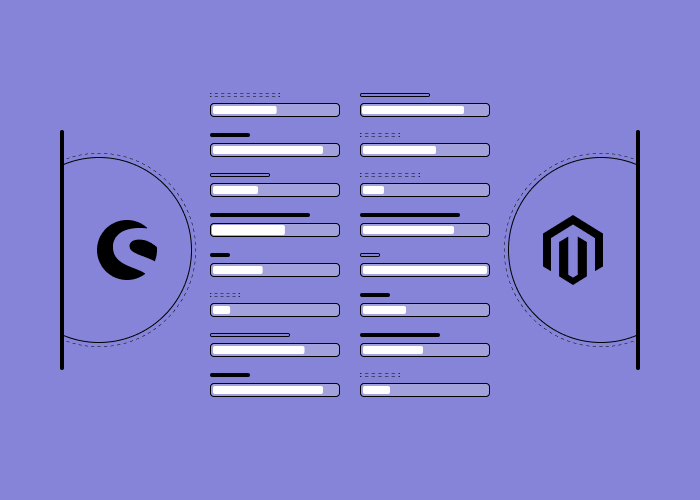Content
Salesforce vs Shopware - Which One Takes the Cake?
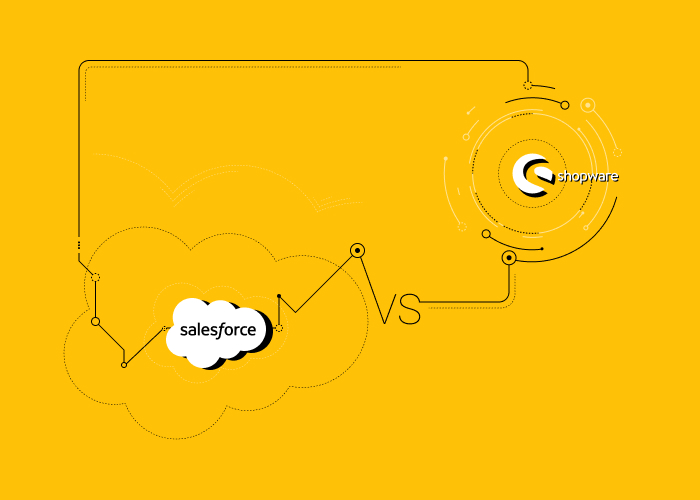
Due to the seemingly ceasing yet still relevant COVID-19 pandemic, the vast majority of eCommerce players are having a pretty rough time. Many seek to reduce the underlying costs wherever possible. And, since the lion's share of the budget usually goes to support the steady performance of online resources, entrepreneurs are focused on the search for the most affordable frameworks.
Lets talk about itHave a project in mind?
This issue is especially relevant for those who have launched their business based on Salesforce - albeit a powerful but rather expensive platform to operate. However, as an alternative, we suggest exploring a much cheaper option that may be even more suitable for your business — Shopware.
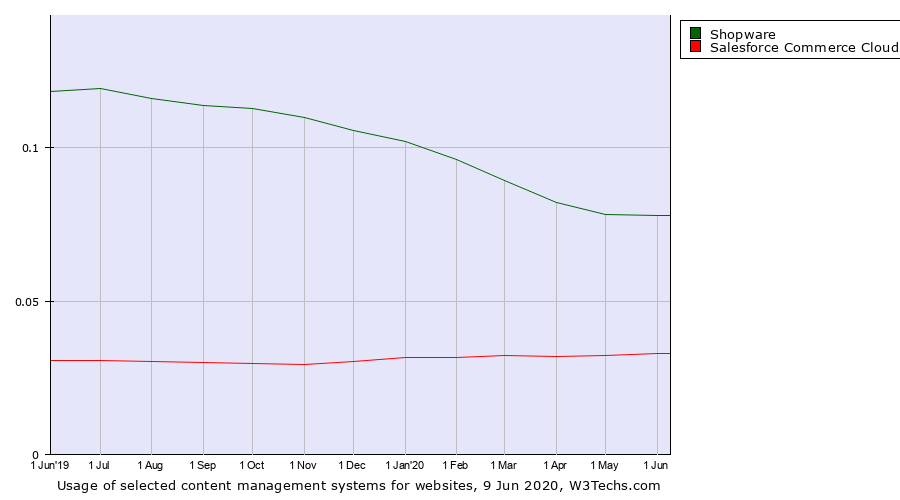
Image Source: w3techs.com
So let’s have a Salesforce vs. Shopware comparison to get to an utterly objective conclusion as to which is better to choose today.
Salesforce - What are the Drawbacks?
The first version of Salesforce was launched back in 1999. It was this brand exactly that was the first company on the market to sell a serious corporate product not as an out-of-the-box solution, but as a SaaS product. That is, for a regular monthly fee. It is quite popular, but its relative non-budget nature and some other features made web developers look for better options eventually.
This truly powerful CRM works based on the SaaS model, providing its users with readymade software accessed through a browser or mobile application. The product is aimed at small, medium, and large businesses, offering features such as:
- contact management;
- lead generation;
- data prediction;
- insightful reporting
- collaborative features;
- workflow automation (of sales, marketing activities, software support, analytics, etc.).
Salesforce has three plans to choose from:
- "Lightning Professional" - $75/month for one user;
- "Lightning Enterprise" - $150/month for one user;
- "Lightning Unlimited" - $300/month for one user.
Despite its high performance and some certainly useful capabilities, Salesforce has its significant downsides, however. Let’s take a look.
Hidden costs
When your eCommerce solution is powered by Salesforce, you automatically find yourself in a situation of budget uncertainty: in addition to the fixed price for the license, you also have to pay a certain percentage of sales. It is only logical that with large sales volumes the amount that you will be forced to pay for using this CMS can become astronomical.
Lack of flexibility
Many developers who work with Salesforce complain that it is impossible to combine features for B2C and B2B in the same solution. Therefore, they have to either create two separate trading floors, or build something universal, but with limited functionality.
Compatibility issues
Salesforce also cannot boast of full compatibility with solutions of third-party vendors, imposing restrictions on developers in terms of integration and forcing them to develop custom APIs themselves.
Complicated database interaction
Lastly, with Salesforce at hand, developers experience difficulty implementing simultaneous access to multiple databases. By default, Salesforce works with its own DBMS and connecting third-party stores quite often leads to certain errors and limitations.
Why Do Entrepreneurs Increasingly Prefer Shopware?
Keeping all the above drawbacks in mind, let’s compare Shopware vs Salesforce Commerce Cloud to see why the first option becomes increasingly more popular.
Shopware is an open-source German eCommerce platform based on PHP. Users are provided with both free and paid (but much cheaper in comparison with Salesforce) version. Shopware is currently employed by more than 800,000 users worldwide. By the way, most recently, the developers of this engine launched the sixth, the most advanced version. Find our comparison of Shopware 5 vs 6 for more details.
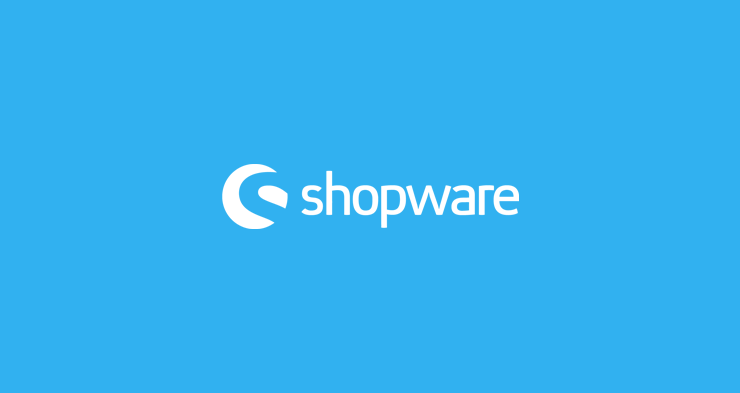
Image Source: ecommercenews.eu
But why exactly in the stand of Salesforce Commerce Cloud vs Shopware, the latter framework seems to get more recognition lately?
Built-in SEO module
The latest two versions of Shopware feature a default SEO module that helps you automate search engine optimization processes in the Google search engine.
Numerous integrations
Unlike Salesforce, Shopware supports a huge number of integrations, including the ones with WordPress CMS, Microsoft web services, as well as with numerous payment gateways (Braintree, Stripe, PayPal, Skrill, etc.). In addition, this CMS allows the connection of additional sales channels, for instance, social networks. And the cherry on the Shopware cake is integration with voice module API, which will be useful for developers who want to implement voice search.
B2B features
Shopware supports a number of features required for B2B format solutions that can easily be combined with features in the B2C segment. Thus, you can connect and configure a virtual office to manage user expenses, a digital designer solution to allow customers to create their own trading platforms, etc.
Simpler store creation
The latest version of Shopware - Shopware 6 differs from its competitors having a truly convenient, accessible, and intuitive graphical editor with which you can create online stores rich in their set of features. Especially pleasing is the presence of a customizable panel for page layout and a full-fledged editor for color solutions.
Extensive customization capabilities
The latest version of Shopware also features the Rule Builder feature, which provides developers with almost unlimited possibilities for customization. With it, you can vary the policies of discounts, payments, customer interactions, set up rules for individual user groups and much, much more. And most importantly, all these features can be connected and configured through the graphical admin panel without the need in any self-written code lines.
Multi-language support
Despite the fact that Shopware is not yet very well-known beyond the expanses of Germany, its developers have provided for the presence of multilingual support, support for many currencies, as well as a lot of settings for selling goods based on the customer location. But this is not all: the framework has advanced search engine optimization algorithms that will help introduce your online store to the international market in two ways.
Topping off to Compare Salesforce vs. Shopware & Making the Right Choice
Now that we know all the details concerning the major differences between the two frameworks, let’s try to see which one can fit a modern entrepreneur better - the finale of the Salesforce vs Shopware stand.
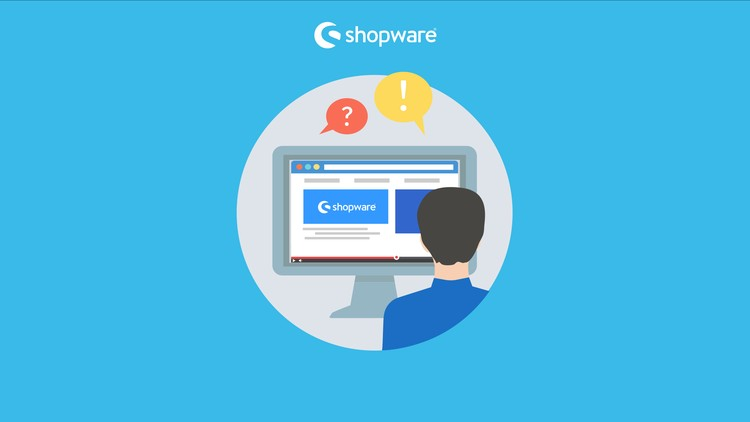
Image Source: img-a.udemycdn.com
In fact, Salesforce has existed in the international market for a long time, which means that it definitely has something to love it for. And this is so: few people doubt the level of Salesforce performance, its reliability, as well as a set of features tried and tested over the years.
On the other hand, the relative impactful costs of this engine are forcing developers to look for other alternatives that would be cheaper, but at the same time not inferior (and possibly even superior) to Salesforce in terms of capabilities. And Shopware development services are getting more and more popular while experts believe that this platform can be deemed such a worthy alternative to Salesforce.
Summing Up the Salesforce Commerce Cloud vs Shopware Comparison
Despite the fact that Shopware so far conquers mainly the Western market, we absolutely justifiably consider it a very promising solution with an optimal price-quality ratio. It has good documentation, an intuitive interface, excellent compatibility with third-party products, as well as a set of advanced features (such as voice search support) that will allow you to create an ultramodern online store.
Therefore, migration to it is an ideal choice for those who want to maintain their former functionality, but at the same time significantly reduce the total cost of operating their eCommerce solution.
We have great expertise in working with solutions on Salesforce and Shopware and can help you painlessly migrate your existing solution from one platform to the other. As a result, you will get a reliable and modern solution that will definitely be affordable as well.
Contact us right now to discuss the details of your future project and find out the cost of migration in your particular case.
Lassen Sie Profis Ihre Herausforderung meistern
Unsere zertifizierten Spezialisten finden die optimale Lösung für Ihr Unternehmen.


